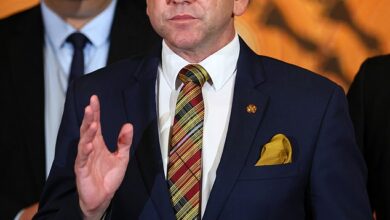Gina Rinehart issues stark warning why Australia is heading straight for disaster – and calls for Israeli ‘Iron Dome’ missile system for specific part of the country

Australia’s richest person, Gina Rinehart, is calling for Israeli Iron Dome missile defence systems to protect mining operations in the country’s north, given their vital economic role.
In a speech at the Bush summit in Port Hedland, Washington, Ms Rinehart warned that Australia was heading for an economic and defence crisis unless there was a change in approach.
Ms Rinehart told her audience that Australia’s mining sector has earned trillions of dollars in export revenue over the past decade.
She noted that these revenues in turn supported many Australian businesses, paying $252 billion in wages and $357 billion in taxes and royalties over the past 10 years. These taxes and royalties enabled Australia to provide for nurses, police, defence, veterans, seniors, emergency services and more.
But the mining magnate said that if plans to switch to 100 percent renewable energy ever came to fruition, the country’s economy would be deprived of this revenue.
That posed a conundrum, she said. “What services would you want to cut without the mining revenue, and how much more tax would you want to pay?
‘Why risk this gold mine, why kill the geese that lay the golden eggs?’
Ms Rinehart, a nuclear power advocate, said that ‘the truth’ is that ‘renewable energy cannot meet our basic electricity needs, the sun doesn’t always shine, the wind doesn’t always blow, the additional investment to make this happen will be enormous’.

Mining billionaire Gina Rinehart (pictured) has used her speech at the Bush summit in Western Australia to issue dire warnings that Australia is heading for economic and defence disaster

Ms Rinehart called for Iron Dome-style defences to protect northern Australia, the country’s economic engine, from missile attacks.
Ms Rinehart did not say that renewables have no value. But she pointed out what she sees as their serious limitations.
“In Australia, solar panels generate about 20-25 percent of the year’s electricity,” she said.
‘Wind is only slightly better, typically it has a ‘capacity factor’ of 30-40 percent.’
‘Hydropower can be a little bit better, maybe 50 percent of the time. But compare that to coal and natural gas.
‘These thermal power plants typically have a capacity factor of 70-90 percent because they can consistently generate electricity as long as fuel is available.’
The businesswoman then made the case for nuclear power, which Opposition Leader Peter Dutton had promised if the Coalition wins the upcoming federal election, which is due in May next year.
“Although it’s not there yet – well, not yet – nuclear power would be the best option. Nuclear power would operate more than 90 percent of the time because it requires less maintenance and is designed to operate for extended periods of time,” Ms. Rinehart said.
Proposal to pay for a stronger defense force
She also spoke about Australia’s defence spending, which she said was “unrealistically and irresponsibly limited”.
“The main responsibility of the government … is the defense of our country,” she said, adding that this is also inextricably linked to the mining sector.
“There’s no point in having resources in the Pilbara unless we can export them and make a profit from them. That’s why we need to have a defence to keep our railways and ports open, and our vital sea routes.”
Ms Rinehart said higher defence spending would be feasible if Australia opened more mines and cut bureaucracy.
She borrowed Donald Trump’s phrase “drill, baby, drill” and said, “dig baby dig! Remove the government barriers that are slowing development and turn (mineral mining) into revenue as quickly as possible.”
She said the world must learn from what is happening in Ukraine “that warfare is changing and therefore our approach to defense must also change.”
“A stark example is the Ukrainian-made war drones that cost little but destroy a $1 billion Russian navy ship. We need defense investments that work today.”

Ms Rinehart first told her audience that Australia’s mining industry has earned trillions of dollars in export revenues over the past decade. The Yandi iron ore mine in the Pilbara is pictured

Ms Rinehart said Australia’s defence spending was ‘unrealistically and irresponsibly limited’. Australian soldiers have been pictured in the UK training Ukrainian recruits
Ms Rinehart said the Pilbara mining area should have ‘protective iron domes like those in Israel, plus war drones and smart sea mines, in abundance, and that this should also be done along our shipping lanes, in the ports and on some of the islands, from the north-west to the north-east’.
She said a stronger defence capability was also needed because “we only have seven days’ worth of fuel reserves in Australia”.
‘It is vital that we can keep our shipping lanes open for fuel supplies, whether that comes from Singapore, the US or elsewhere.
“We can say, let’s not spend money on our defense and rely on the US, but what would that actually mean if we can’t protect our shipping lanes and ports so that fuel, defense equipment and heavy supplies from the US can reach us?”




